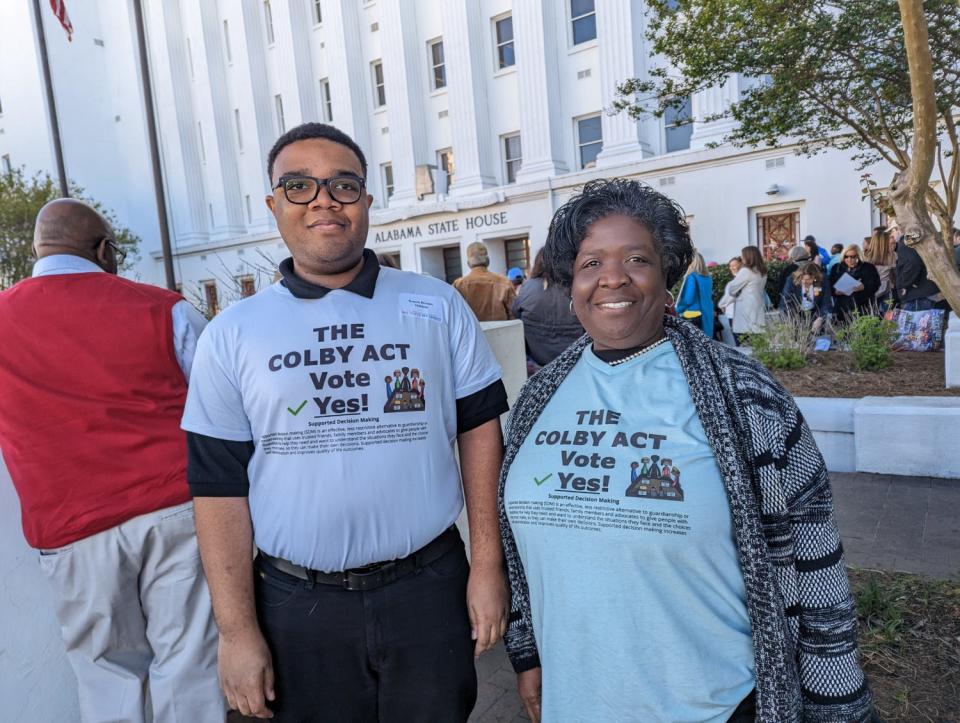Bill could give Alabamians with disabilities more legal independence
Erech Brown is creating his own podcast, Splatter ‘til it Matters, and designing shirts, including one worn by advocates on the steps of the Alabama House Wednesday morning.
While he makes his own money, Brown, an autistic 23-year-old from Helena in Shelby County, said that he came to the state Capitol to “talk about how to make our own choices, speaking up for our rights and learn how to self-advocate for ourselves.”
“And using my voice will help get more into my creativity,” he said.
Brown said that he trusts his mother, Gwendolyn Brown, 53, to help him make decisions independently. Gwendolyn Brown said that her son doesn’t always need to be her “in the driver’s seat.”
“He has a lot of opinions about what he wants to do. And by having a team effort beyond the home, then I believe he’ll reach a lot more goals,” she said.
Alabamians with disabilities like Brown’s often have to give up their rights to make their own decisions as adults. Current laws can place disabled people under a conservatorship or guardianship even if they are capable of living independently.

Disability rights advocates say those systems take away decision-making power from the disabled. In Alabama, a conservator may consent to marriage on a person’s behalf, consent to medical care, and, with a court order, even pay themselves a “reasonable compensation.”
A prefiled bill would give disabled people more options.
The Colby Act, sponsored by Sen. Arthur Orr, R-Decatur, would create what Orr called a “mid-grade” between the current systems of conservatorship, which involves the management of a person’s assets; guardianship, which involves the caretaking of an individual, and complete independence.
“This is in-between those two extremes and allows a subset of folks the ability to function independently, but they have a support person,” Orr said. “I think it certainly is good and allows them to operate more independently, rather than under current law — just rolling into a guardianship.”
A rally for the bill was held at the State House Wednesday morning. Corrie Merchant, secretary of Down Syndrome Alabama and one of the rally’s main organizers, said that guardianships strip those with disabilities of any decision-making ability. The Colby Act, she said, would give disabled people the same right any other citizen has when it comes to making informed decisions.
“So, they would have the option of using supported decision making, which allows them to use supports that they appoint to help them make decisions,” she said. “Which is no different than what you and I do, right?”
Jamie Harding, communications director for AARP Alabama, said in a statement that the group supports the bill. The laws on guardianships and conservatorships have not seen major changes since the 1980s, the group has been working to modernize them.
“Supported decision-making allows the individual to maintain their agency while receiving support from a trusted group of advisors,” the statement said. “We firmly believe that the laws need to include more individualized solutions, rather than a one-size-fits-all approach.”

Rep. Bill Lamb, R-Tuscaloosa, said he supports the bill and thinks it has a good chance of becoming law.
“It reflects the intelligence and dignity of individuals to, concurrent with their disability, make very good, self-management decisions and improve their own quality of life,” Lamb said.
Daniel Chaplin from Homewood in Jefferson County said that people need to hear their stories directly from disabled people, not their parents, siblings, or friends.
“Each of us has our own hopes and dreams, and our voices need to be heard. And if you don’t speak for yourself, people can’t really know what you want,” he said.
Chaplin is a distance runner who’s participated in half-marathons in 41 different states. He serves on the board of director for the National Down Syndrome Congress for nearly nine years, is a ballroom dancer and works 30 hours a week at a law firm in Birmingham. And he is a voter.
“I think that all parents of people with disabilities really have a lot of anxiety about what will happen when we are gone,” said David Chaplin, Daniel’s father. “The more Daniel is able to really advocate for himself, the better.”
He said that he wants Daniel to have the experience of making decisions for himself. Seeing what the consequences are helps him make better decisions the next time.
“He has very good common sense. He makes a lot of good decisions,” he said.
Alabama Reflector is part of States Newsroom, an independent nonprofit website covering politics and policy in state capitals around the nation.
This article originally appeared on Montgomery Advertiser: Bill would give Alabamians with disabilities more legal independence

